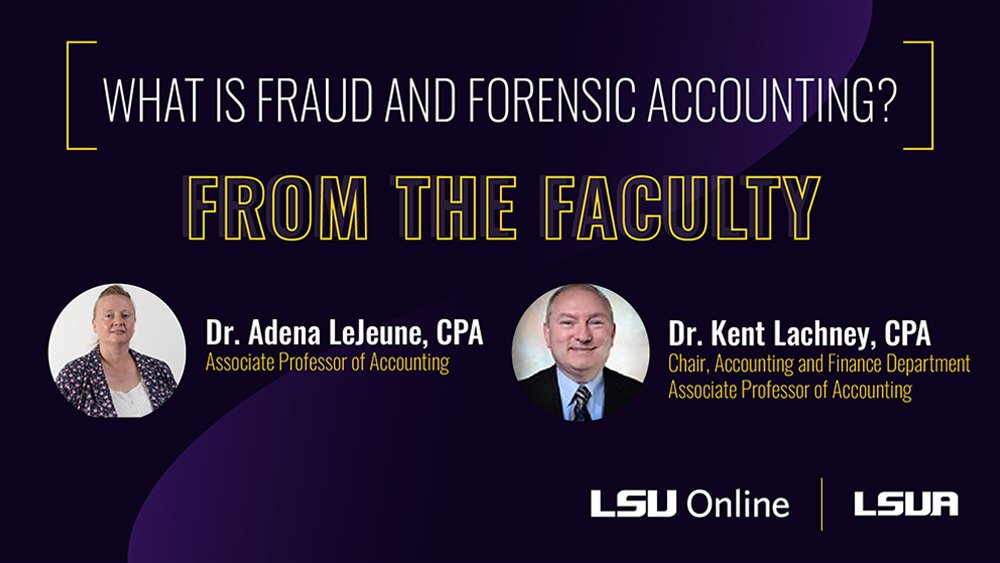Forensic accounting is a specialized field that involves dissecting an individual's or an organization's financial activities with a meticulous eye for detail. Forensic accountants are financial detectives who scrutinize records, transactions, and accounts to unveil discrepancies, irregular patterns, and potential financial misconduct. These skills are highly regarded in the financial world and can be used across industries.
The LSUA online Bachelor of Science in Accounting with a concentration in Fraud and Forensic Accounting provides graduates with a deep understanding of conducting effective forensic accounting and preparing reports and insights based on their findings.
Forensic Accounting and Fraud
Fraud refers to the intentional use of deceit or misrepresentation for financial gain or advantage. One type of fraud is financial statement fraud, the manipulation of financial statements, typically carried out by company management to distort a business's true financial health. This unethical act can take many forms including overstated revenue or misrepresented assets and liabilities, ultimately leading to the falsification of financial statements. The consequences of accounting fraud can be severe for those who rely on financial statements to make financial decisions.
Tax evasion is another type of fraud. A forensic accountant may be called upon to help determine if a business provided false information on its annual tax filing. They might audit the organization's bank records, analyze past deposits and transactions, and discover that the business earned more than it claimed on its tax filings, presenting these findings in court.
Other types of fraud forensic accountants may uncover include a wide range of financial misdeeds, such as:
- Embezzlement: The U.S. Department of Justice states that “embezzlement is the fraudulent appropriation of property by a person to whom such property has been entrusted, or into whose hands it has lawfully come.” Embezzlement may include an employee transferring funds from the company payroll to a personal account or a lawmaker or politician purchasing personal luxury items with money designated for a government initiative.
- Money Laundering: A person or business may earn money from participating in or committing certain illegal or prohibited acts. “Money laundering is the processing of these criminal proceeds to disguise their illegal origin,” according to the Financial Action Task Force. Examples of money laundering may include a drug trafficker transferring illegally obtained money into a nonprofit organization to make it appear more legitimate or criminals who just committed a robbery taking their money to a casino to make it look as if they had won it from gambling.
Careers in Forensic Accounting
Forensic accounting isn't confined to a single industry or setting. Professionals trained in this discipline find opportunities in various fields and scenarios:
- Government Agencies: Entities such as the FBI, IRS, and CIA employ forensic accountants to uncover financial crimes and explore connections to other unlawful activities.
- Insurance Companies: Forensic accountants in the insurance field assist in evaluating policyholders' actual economic losses, such as damages from car accidents or property destruction, and support their claims.
- Construction Projects: In cases of project delays, forensic accounting investigates whether fraud or other misconduct contributes to setbacks.
- Civil and Business Disputes: In non-criminal legal disputes, forensic accounting helps parties substantiate claims, from divorce proceedings to business valuations.
- Nonprofit Organizations: Nonprofits employ forensic accounting to verify donations, ensuring financial transparency and providing assurance to donors.
About the Online Bachelor of Science in Accounting with a Concentration in Fraud and Forensic Accounting
The online Bachelor of Science in Accounting with a Concentration in Fraud and Forensic Accounting is offered through LSU Alexandria. In this comprehensive program, you'll acquire specific skills that will empower you for success in finance. This online Bachelor of Science in Accounting degree provides students with a well-rounded business education, focusing on creative problem-solving, critical thinking, and in-depth knowledge of how organizations operate in the dynamic global environment.
This Bachelor of Science in Accounting is accredited by the Accreditation Council for Business Schools and Programs (ACBSP). The concentration in Fraud and Forensic Accounting is a candidate for accreditation. In addition, if you aspire to become a Certified Public Accountant (CPA), this online accounting degree meets the requirements to sit for the CPA examination in Louisiana and many other states. Check with your State Board of Accountancy for the educational requirements to sit for the CPA exam and licensure. Faculty advisors work with students to select courses to meet varying state requirements.
The faculty comprises experts in the field, including licensed CPAs. They bring a wealth of practical experience and expertise to the virtual classroom, ensuring you receive the highest quality education throughout your time in the program.
Explore a Rewarding Career in Forensic Accounting
Forensic accounting offers a rewarding career path for accounting professionals with analytical and investigative skills. If you aspire to make a positive impact in the financial world, the LSUA online Bachelor of Science in Accounting is your gateway to success.
Learn more about the program, or apply today!
Explore the online Bachelor of Science in Accounting from LSUA!
Online BS in AccountingSources:
- Association of Certified Fraud Examiners, Forensic Accountant
- Association of Certified Fraud Examiners, Fraud 101
- Business Insider, “There’s a Good Chance You’re a Victim of Credit Card Scams and You Don’t Even Know It — Here’s What to Do”
- Financial Action Task Force, What Is Money Laundering?
- Investopedia, Forensic Accounting
- The Wall Street Journal, “Elder Fraud on the Rise”
- The Washington Post, “Mortgage Fraud Is Rising, According to a New Report”
- U.S. Department of Justice, Embezzlement
